In ecommerce, keeping track of the competitors' prices and offerings is a must to stay afloat. And the only way to do it at scale is to automate the process with a price monitoring tool.
In this article, you'll see a comparison of the top online price tracking software on the market, along with the highlights of their key features:
| Tool | Best for | Pricing |
|---|---|---|
| ZenRows | Extracting pricing data | 1,000 free API credits and paid plans from $49/mo |
| Competera | Pricing optimization and competitive intelligence platform | Undisclosed pricing |
| Price2Spy | Dynamic pricing and price monitoring software | Paid plans from $26.95/mo |
| Skuuudle | Price and MAP monitoring platform | Undisclosed customizable pricing |
| Prisync | Competitor price tracking and dynamic pricing software | Paid plans from $99/mo |
| Repricer | Real-time price adjusting tool | Paid plans from $179/mo |
| Omnia Retail | Dynamic pricing software for D2C | Paid plans start at €199 |
| BQool Repricing Central | TCloud-based repricing tool | Paid plans start at $22.5/mo |
| PriceShape | Pricing intelligence platform | Undisclosed pricing |
| Zilliant | Competitor price monitoring for B2B companies | Undisclosed pricing |
What Is Price Monitoring?
Price monitoring refers to tracking the prices of certain goods and services over time. It requires regular analysis of price fluctuations and the patterns behind them and helps in industries driven by dynamic pricing and steep competition.
For e-commerce businesses, price monitoring provides insights into the competitors' pricing strategies, market trends, and changes in demand so that they can adjust accordingly. Individuals can track prices to make informed decisions and get the best value for money.
How to Keep Track of Competitors' Prices
There are several ways to keep track of changes in your competitors' product prices:
- Conduct regular market analysis: Visit competitors' websites, physical stores, or online marketplaces and manually check their prices and offerings. While this method lets you get well-acquainted with the competitors' strategy, it's time-consuming and not sustainable in any dynamically changing industry.
- Analyze market data: Market research and marketing tools such as Google Trends, SEMrush, and SimilarWeb allow you to observe trends, track mentions, analyze sentiment, and more. However, the process requires experience with market monitoring and takes up a lot of time since some information still needs to be checked manually.
- Use price monitoring tools: This is the best way to go! Price tracking tools can help you automate the whole competitor monitoring process, alert you about changes, and extract all the market data you want.
What Are Price Monitoring Tools
Price monitoring tools are software applications that help businesses keep track of their competitors and adjust their offerings. They use web scraping technology to extract pricing data from various sources, such as ecommerce websites, online marketplaces, social media platforms, or APIs. They help uncover the current information on pricing, trends and patterns, and even predict possible changes.
Apart from just price monitoring, the tools often offer other features, such as:
- Price comparison.
- Price changes alerts.
- Historical data analysis.
- Competitors offering analysis.
What are the benefits of price monitoring tools?
If you're still wondering if price monitoring tools can bring you a good return on investment, here are their top benefits:
Data-based pricing for your products
You'll easily make informed decisions on how to price your products. With knowledge of industry trends, current competitors' prices, and your customers' buying patterns, you'll stop basing your decisions on intuition and over- or undercharging.
Discovering industry trends and patterns, tracking customer behavior
You'll uncover patterns in your customers' buying habits that go beyond the obvious assumptions, such as Christmas shopping fever. Better yet, you'll be able to monitor trends across the whole niche by tracking how your competitors extend their offerings, when your product gets mentioned the most, and when your customers are willing to spend the most in your own store.
Informed competitor analysis
You'll always know what other retailers are up to with their pricing strategy, marketing activities, new additions to their stores, and more. You'll be able to keep your benchmarks fresh and never lag behind your competitors.
Now that you know how price monitoring software can help you, let's review the top 10 candidates for a new addition to your tool stack.
Price monitoring software: Top 10 tools
Here are the ten best price monitoring tools you can use for online price monitoring and competitor analysis.
ZenRows: Best Pricing Data Extraction Tool
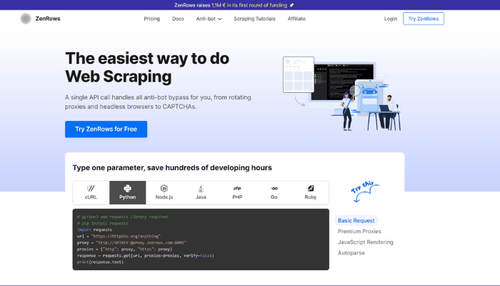
ZenRows is a web scraping API that allows developers to extract pricing data from websites and help optimize pricing strategies.
It saves users the trouble of writing code or managing servers and returns the data in a JSON format that makes it convenient for further analysis. Other than that, ZenRows is a surefire way of bypassing all anti-bot detection systems, which is crucial when scraping highly protected ecommerce websites. You'll be able to uncover all the publicly available data from your competitors' sites.
👍 Pros:
- Easy-to-navigate dashboard.
- Customizable requests.
- Full anti-bot bypass.
- 24/7 technical support.
- JSON data ready for further analysis.
- Flexible use cases (you can scrape any page type).
👎 Cons:
- Requires coding knowledge to use.
💰 Pricing:
- 1,000 free API credits.
- Paid plans start at €49/month.
Competera: Price Optimization Tool for Retailers
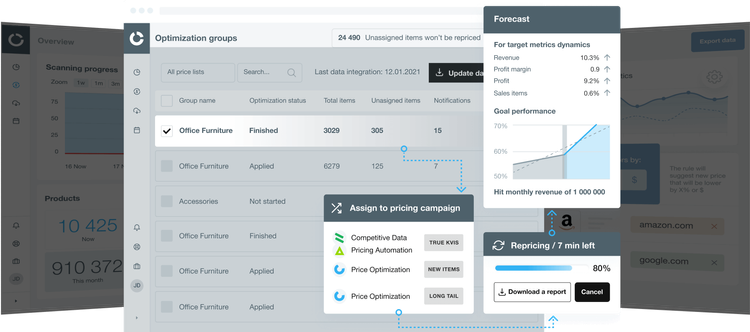
Competera is a pricing optimization and competitive intelligence platform that helps businesses improve their pricing strategy. It uses advanced data analytics and machine learning algorithms to collect e-commerce data and provide real-time insights into market trends, pricing fluctuations, and competitors' strategies.
Competera is a comprehensive e-commerce platform suitable for big players with no budget constraints. Stores below the enterprise level should look elsewhere.
👍 Pros:
- Pricing automation tools.
- Customizable pricing strategies.
- Many integration options.
- Suitable for a wide range of industries.
👎 Cons:
- Challenging setup and learning curve.
- High cost.
💰 Pricing:
- Free trial.
- Undisclosed pricing.
Price2Spy: S Large-Scale Price Tracking Tool
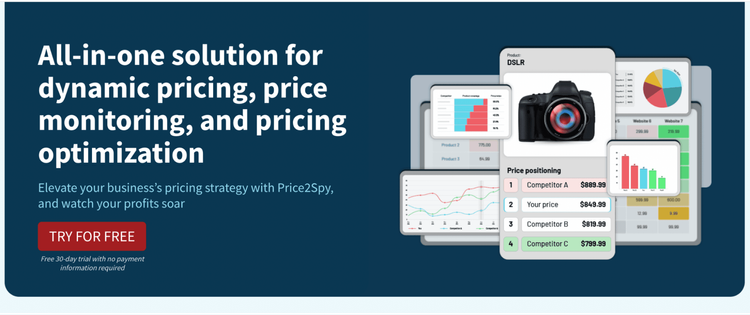
Price2Spy is a dynamic pricing and price monitoring plus optimization software designed for online retailers, brands, and manufacturers. It allows users to track competitor pricing across a wide range of ecommerce platforms and marketplaces and seek patterns in their own pricing and profits to remain competitive and profitable.
👍 Pros:
- Detailed reporting and analytics features.
- Customizable pricing rules.
- Dynamic pricing feature to instantly adapt.
- Multiple product-matching solutions.
👎 Cons:
- Limited integrations.
- Limited number of monitored items.
- Limited data formats when scraping (CSV and XML only).
💰 Pricing:
- 30-day free trial.
- Paid plans start at $26.95/month (for up to 100 Product URLs and up to 20 sites/competitors).
Skuuudle: A Price Tracking Tool for Domestic and Global Marketplaces
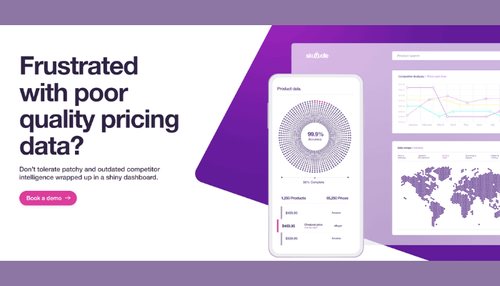
Skuuudle is a price monitoring platform with features including competitor and pricing intelligence, web scraping, MAP (Minimum Advertised Price) monitoring, and product matching.
Skuuudle prides itself on completely automating the matching process). It helps businesses optimize their pricing strategies and identify new market opportunities.
👍 Pros:
- Accurate and reliable pricing intelligence.
- Customizable, exhaustive reporting.
- A wide range of platform integrations.
- Web scraping for ecommerce.
👎 Cons:
- Limited integrations.
- Steep learning curve.
💰 Pricing:
- Customizable pricing available upon request.
Prisync: Competitor Price Tracking & Monitoring Software
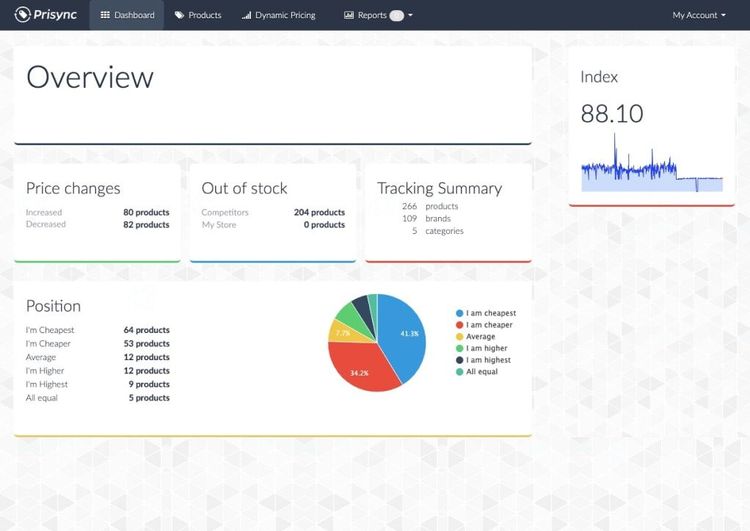
Prisync is a competitor price tracking and dynamic pricing software that allows businesses to gather and analyze competitor insights in real time. It focuses on Google Shopping and Shopify solutions and boasts high-class, proactive customer service. Notably, the platform includes a feature called Digital Shelf Management, which helps brands optimize their ecommerce product details across all their online retailers.
👍 Pros:
- Competitor pricing strategies tracked across multiple channels.
- Automated pricing rules setting.
- Integrations with popular ecommerce platforms.
- Customizable reports and analytics.
👎 Cons:
- Challenging setup.
- Limited integrations.
💰 Pricing:
- 14-day free trial.
- Paid plans start at $99/month (no API access for the cheapest plan)
Repricer: Price-Adjusting Tool
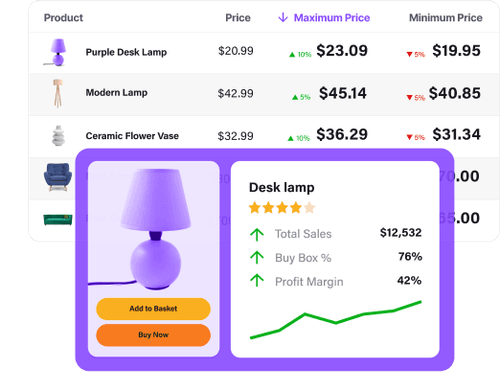
Repricer is a cloud-based software designed to help online sellers stay competitive in the biggest marketplaces, such as Amazon and eBay. It monitors prices, automatically adjusts the prices of its users' products based on real-time analysis of the current market conditions, and provides automated advice on the best marketplace strategies.
👍 Pros:
- Detailed reports on competitor pricing, sales history, and profitability.
- Easy-to-use interface.
- Safe mode (only change prices when you’re ready).
- Convenient filtering options.
👎 Cons:
- Challenging onboarding.
- Occasional UI issues.
💰 Pricing:
- 14-day free trial.
- Paid plans start at $179/month.
Omnia Retail: Dynamic Pricing Software
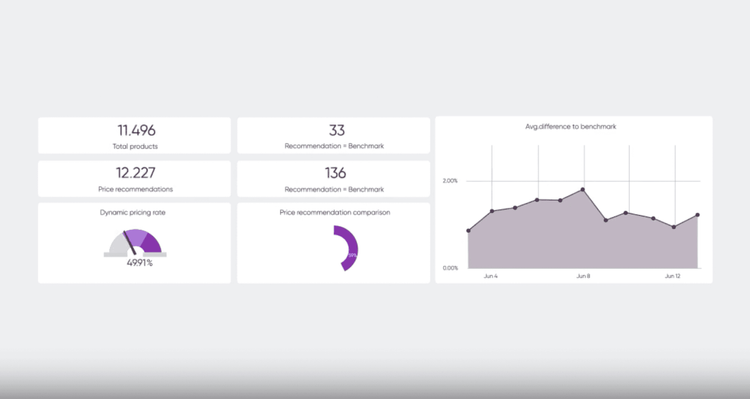
Omnia Retail uses artificial intelligence and machine learning to help D2C brands and retailers optimize their pricing strategies. It enables dynamic price adjustments in response to changes in demand, competition, and other factors. Its solutions cater to businesses of all sizes, industries, and marketplaces.
👍 Pros:
- Full dynamic pricing automation with customization.
- Integrates with multiple marketplaces.
- Solutions for many specific industries.
- Suitable for businesses of all sizes (high scalability).
👎 Cons:
- High prices.
- The initial setup requires some technical knowledge.
💰 Pricing:
- Free trial.
- The price monitoring toolkit starts at €199. Access to dynamic pricing features is more expensive.
BQool Repricing Central: AI-Powered Repricer
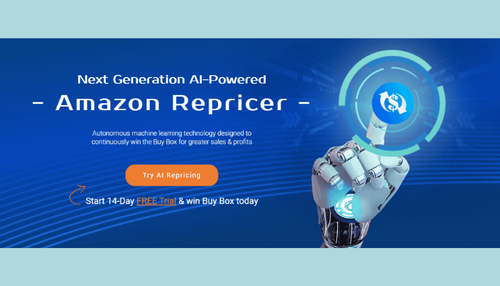
BQool Repricing Central is a cloud-based repricing tool designed to help retailers automate their pricing strategy and increase sales. It offers conditional, AI-power, and rule-based repricer variations for super-accurate price adjustment.
👍 Pros:
- Automatic real-time repricing in response based on advanced conditioning.
- Detailed analytics.
- Integrates with Amazon's API.
👎 Cons:
- Narrow scraping capabilities.
- Limited integration options.
💰 Pricing:
- 14-day free trial.
- Paid plans start at $22.5/mo for a limited basic plan. AI-powered plans start at $40 a month.
PriceShape: Best Price Recommendation Tool
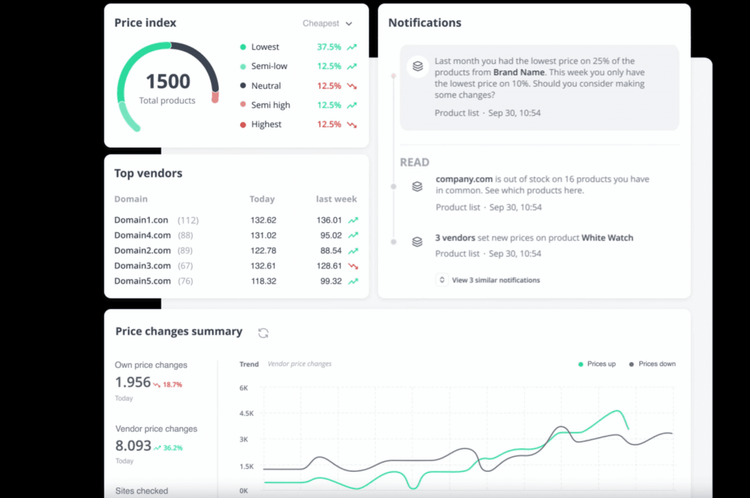
PriceShape is a pricing intelligence platform that collects data from various sources and presents them in easily digestible reports. It caters to retailers and brands alike. On top of features such as price and competition monitoring and performance insights, it also offers analytics dedicated to marketing and product management.
👍 Pros:
- Automated data collection.
- Advanced reporting capabilities.
- Integrations with popular ecommerce tools, like Shopify, Magento, and WooCommerce.
👎 Cons:
- High learning curve.
- Steep prices.
💰 Pricing:
- Prices available upon request.
Zilliant: Price Monitoring Tool for B2B Companies
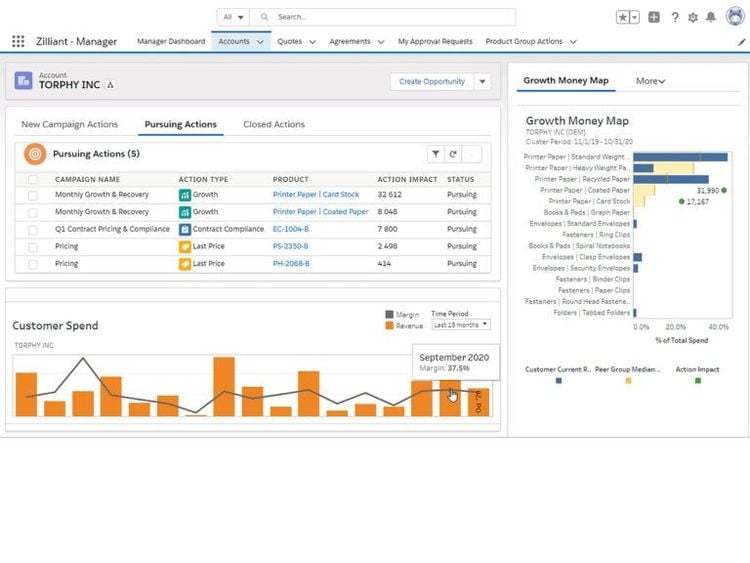
Zilliant offers AI-powered pricing strategies and sales optimization solutions for B2B companies. Apart from being a typical price monitoring tool, Zilliant's goal is to empower sales teams to close deals quicker and better. The AI algorithms analyze large datasets to identify pricing opportunities and recommend profit-increasing changes. This tool caters to diverse industries, including manufacturing, distribution, healthcare, etc.
👍 Pros:
- Many integrations with other systems, including ARP and CRM.
- Project-management features, such as sales planner or campaign manager.
- Highly customizable analytics dashboards.
👎 Cons:
- Occasionally slow data processing.
- Steep learning curve.
💰 Pricing:
- Pricing available upon request.
Conclusion
Choosing the best price monitoring tool among all the options is a challenge. As usual, the decision boils down to your budget and specific priorities. Do you mainly want to freely scrape the web to get competitor data, or do you require a full sales-supporting platform?
Hopefully, after reading this guide, you're all set to pick a price-tracking tool best suited to your needs.
And if you're ready to start extracting pricing data right now, check out ZenRows with a free trial.
Did you find the content helpful? Spread the word and share it on Twitter, or LinkedIn.